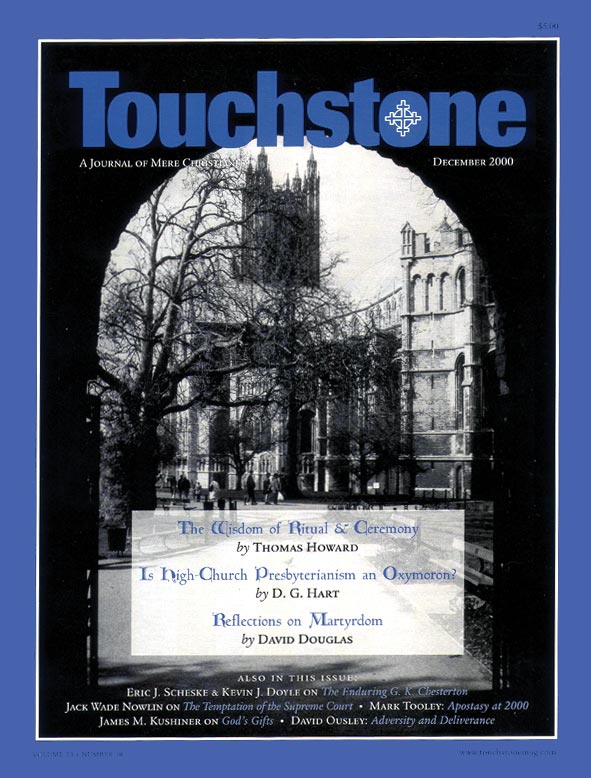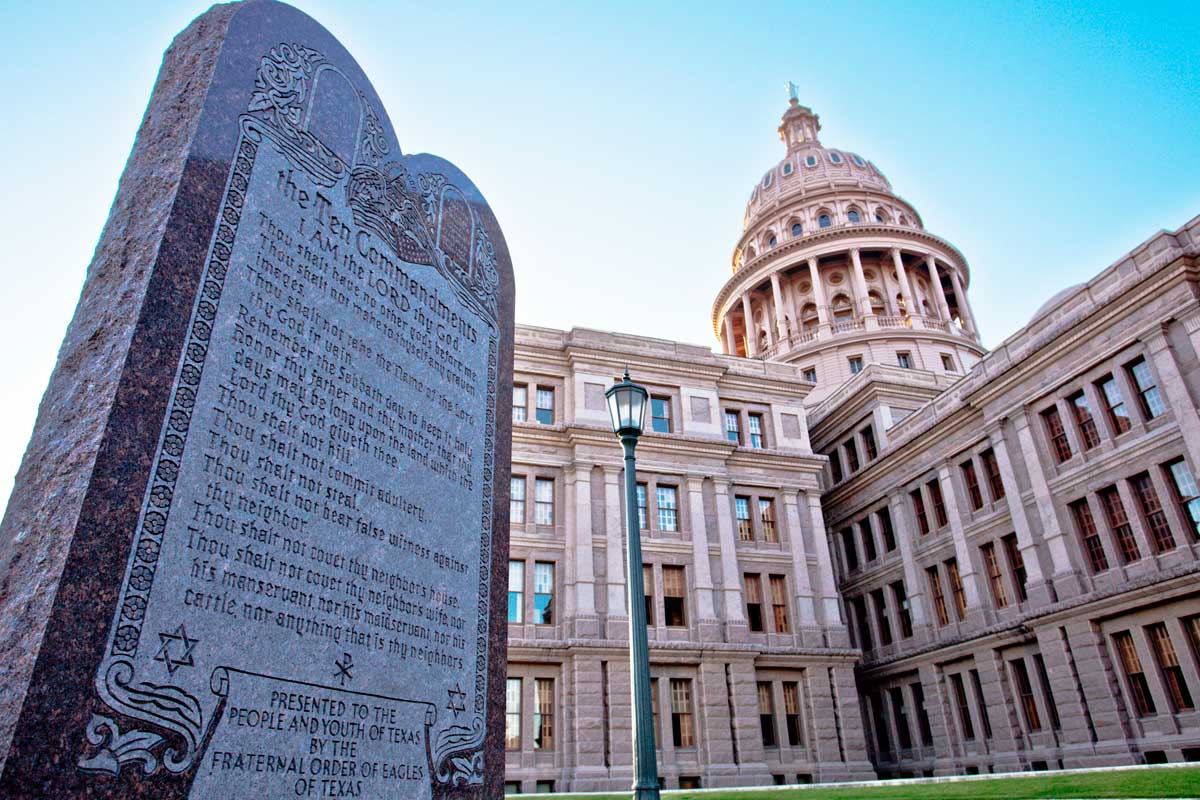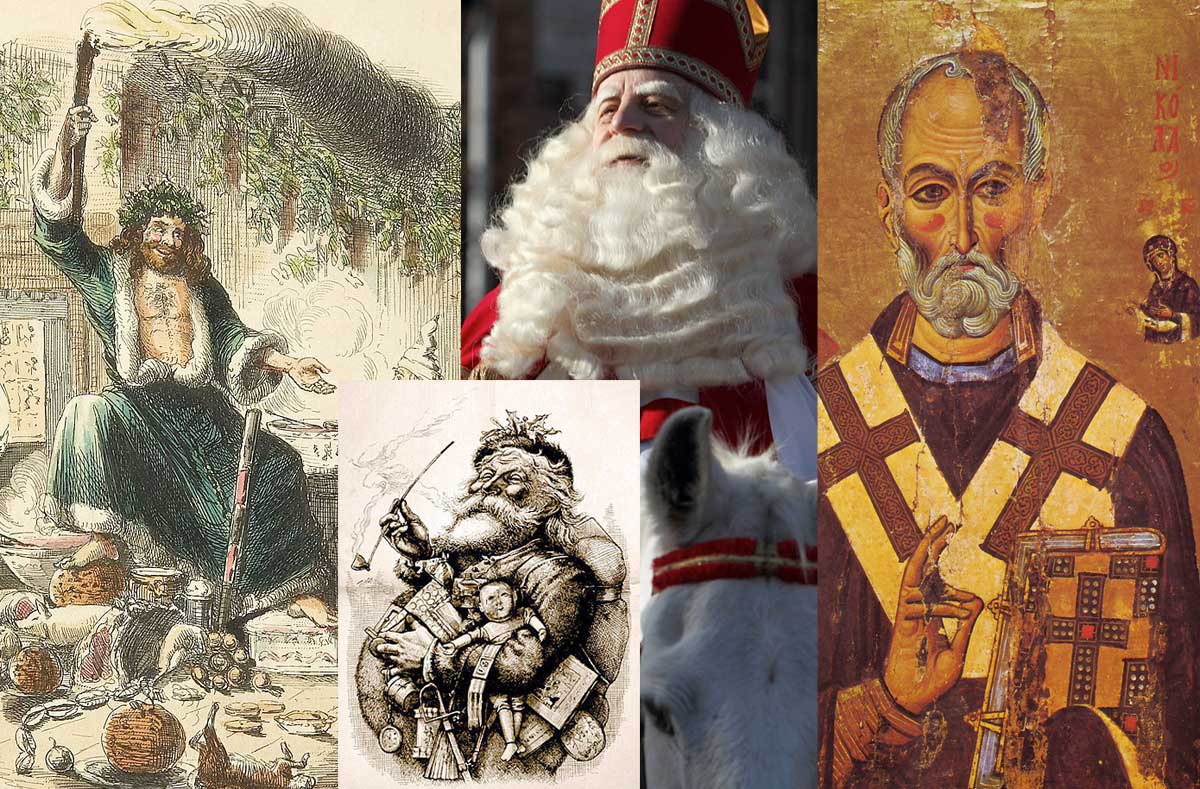The Power of Wise Custom
Thomas Howard on Ritual & Ceremony
Two words cast a pall over the imagination of those who have grown up since 1960—during this 40 years, that is, when spontaneity, naturalness, creativity, sincerity, and what we might call the visceral, have been so earnestly extolled. The two words are ritual and ceremony.
Spirits wither straightaway. “Dull!” we hear from one corner. “Repressive!” from another. “An imposition! A straitjacket!” we hear from various quarters. “What we want is freedom to be ourselves—our natural, real, unconstrained selves. Ritual and ceremony are guaranteed to stifle all vitality and genuineness. They are a recipe for ennui.”
Well, yes, we might say, your frantic objections are not altogether without warrant. But we need, clearly, to revisit the topic. If we leave things with those objections granted, we settle for an impoverishment of human life so tragic that famine itself is not too strong a word to bring into play.
Strong words, indeed, from all sides. What nerve have we touched, that we get this leaping response? What spot have we lanced that people recoil so? It is a matter, we begin to think, of challenging certain modern assumptions so deep that those who hold them feel threatened, and those of us (those few of us, it often seems) who reject them root and branch feel a certain desperation.
Our Floundering Century
Our century flounders along in the wake of the Promethean and Faustian romanticism that stole over the entire West from Germany in the eighteenth century (helped along a good bit by Rousseau). Prometheus was the Titan who (God love him) stole fire from Zeus because he saw us mortals shivering in the cold. Faust was the scholar who, finally bored with the usual academic fields, decided on magic, and made a pact with Mephistopheles, or Satan (Mephisto was only a lackey), to the effect that he could have his wishes if he signed over his soul to Satan for eventual disposal.
Prometheus and Faust became the heroes of everyone who wished to call his own shots, so to speak, to shape his own destiny free of meddlesome gods or moral codes. A spin-off from this center is the distrust of ritual and ceremony that is almost universal now, for a man who objects to ritual and ceremony is a man who would prefer to “do his own thing” rather than be clamped into a pre-ordered scheme.
This preference began to show itself extravagantly in the sixties and seventies. In clothes, for example. Costume and uniform have always borne great significance. They bespeak the occasion. A nurse on duty appears in starched, immaculate white (the idea being hygiene). A policeman on duty appears in blue, with a special hat (the London bobbies had the best ones), the idea being: Here we have a man with authority.
A housewife wore a “house dress” during her working hours—decent, but not “dressy.” Your dressy dresses (velvet, silk, and brocade) meant church, or the opera, or a dinner party. Men wore a suit, including waistcoat, stiff collar, necktie, and fedora, to work (look at any news photo up through the 1950s for proof). And of course tribal costume, regimental costume, royal attire, and priestly vestments would be the most colorful cases in point of ceremonial dress—dress, that is, prescribed by the identity of the wearer and the demands of the occasion (crowning a new king, or opening parliament, or going up to meet the gods).
This has all disappeared, as we know, or most of it. It lingers, of course, in a few contexts. But such contexts are dwindling. My son, for example, goes to work on Wall Street—certainly the last bastion of your man-in-a-three-piece-suit. Firm after firm is now permitting informal dress for the workday. I have not seen a nurse in white for, I suppose, thirty years.
And my peers and fellow travelers on airplanes (you used to “dress up” to travel): tank tops, shorts, or anything your whim may have suggested to you is the order of the day. We must all travel amiably with hairy legs, elephantine legs, hairy shoulders, and nipples straining at the T-shirt. The rubric is: “Well, hey! I dress the way I want to. It’s me, everybody. Sorry if you’re so uptight as to notice, much less be offended.”
We seem to have strayed from our topic. But clothes, along with language, posture, attitude, décor, and “special events,” all furnish us with indices of how a given civilization or era stands vis-à-vis existence itself: and public ritual and ceremony, of which these are all a part, were, for ten thousand years of myth and history, looked upon as—known, let me say, to be—the very guarantors of both significance, and of our humanity itself.
Unnecessary Rituals
What does this mean? We may take as an extreme example the coronation of a monarch. Not one single gewgaw of the whole business is “necessary.” Crowns, scepters, orbs, ermine, state trumpets, processions, velvet, diamonds, bowings, heralds in tabards—not one molecule of all that paraphernalia is actually necessary. But somehow we want it all. And in so wanting, we have taken our place along with every tribe, culture, civilization, and society ever known. Whether the crown is of feathers or of gold is not the point. The monarch is, must be, set apart.
Or, somewhat closer to home, a wedding: none of the “rules” accomplishes a thing, pragmatically. (The bride’s train just drags along the floor and gets dirty, for heaven’s sake.) The slow, measured walk down the aisle, the special clothes, the book from which the minister reads, the canned vows: it is all increasingly called into question now.
Couples write their own vows, the idea being, “But we want this to be our wedding. We want it to express who we are. We want our friends to share our joy, and they can’t do that if we have to say words someone else wrote a long time ago. If things are going to be real, they have to spring spontaneously from our love, and not from a printed page.”
Hmm. Are you sure you are on firm ground there? We might ponder a few embarrassingly obvious items.
First, spontaneous or not, we would all agree that there are some spontaneous displays that we don’t want just now (we are still talking of weddings here). An infant vomiting, for example. Very spontaneous, and natural, and perfectly sincere, but somewhat disconcerting to the rest of us. Or some well-meaning relative who rushes out to rumple the bride’s hair lovingly as she comes in. Or some bright soul who jumps up in the middle of the proceedings to share a reading that has meant a lot to her.
No. Oddly, some “rule” is presiding here. Some decorum, some appropriateness, some acknowledgment of a weight of significance suffusing the occasion. We can’t quite do what we want. At some point the rest of us have to lapse into silence, and focus our entire attention on the ceremony that is occurring.
Second, it turns out that we do, after all, most earnestly wish the occasion to be a ceremonial one. A couple doesn’t get married, be they never so blithe and earthy, on the fly in the middle of a game of hide-and-seek. Everything else has to stop. And what occurs now must have some forethought investing it.
If we do not like Thomas Cranmer’s angelic English, that, of course, is a very great pity. God himself will not prevent our cobbling up our vows. But, one way or another, they have got to be cobbled up. It may indeed be the case that some wedding has occurred somewhere, in which the man and woman (they would scarcely wish to be called by such heavily ornamented words as bride and groom) sauntered up to some random spot, accompanied by the ragtag and bobtail of their friends, and “chatted” their vows. Perhaps so. But such an event will not serve, we suspect, as any sort of paradigm for weddings. All of anthropology, sociology, and religion cry out against it.
The Paradox
Third, our spontaneity caucus is missing something. It is missing the paradox that lies at the root of all ceremony and ritual, namely, that by reaching for the artificial phenomenon of ceremony, lo and behold, we are all carried beyond the shallow puddles of the spontaneous, into the deeps of genuine significance.
Through the imposed, we meet the natural. Through the prescribed, we meet the sincere. This is always and everywhere true. No tribe, culture, civilization, or society has ever operated on any other assumption.
Birth rites, puberty rites, marriage rites, death rites: no one gives the back of his hand to these things. Huns, Florentines, Saxons, Watutsi, and Athenians all agree here. If you are approaching something significant, or if you want to discern the significance of an event, you must submit to ceremony. (It might be apposite here to make a small distinction: the word ritual refers to the words of the ceremony, and the word ceremony refers to the movements entailed.)
We do not, for example, hunt up the nearest dumpster when a death has occurred. That would be practical; the body, after all, is of no more use to its owner. The event calls loudly for elaboration, not so that we may all escape the awful meaning of it all, but, contrarily, so that we may all enter more fully into the awful meaning. Hence, slow processions, solemn music, hush, and courtesy.
Birth: the frippery of blue versus pink, and of showers, and nurseries all bedecked, and cigars and champagne—these all appear in the service of immense significance (the mystery of a new personhood is amongst us), and assist us in grasping the mystery. Ceremony gives us something to do, when doing nothing would leave us frantic and awash, or else (and this is worse) as oblivious to the mystery before us as the animals.
How to Worship
Now obviously, the topic that is being held in abeyance here is worship. Here is the point of all of our ruminations. How should we worship?
It would seem presumptuous in the extreme for any mortal to take upon himself the authority to dictate to another how to worship. “Good heavens, man, are you serious? You are outgodding God. Don’t tell me how to worship.”
Who, indeed, will presume to legislate here? Surely God loves the spontaneous noises of his creatures: the buzzing of the wasp, the croaking of the frog, the scream of the eagle. Would this not include my own staggering efforts to find impromptu words with which to praise him? The form, or formlessness, of public worship is purely a matter of taste.
Not altogether. Those who urge this upon us forget two things: first, there is no such thing as spontaneity in any regularly recurring public occasion. Quakers, Brethren, and Pentecostals all would testify to this. Anyone from any of those “informal” purlieus will tell us that everyone present knows exactly what is going to happen, and when, and with what phraseology. There is an unmistakable beginning to the “service,” and an unmistakable end; and what happens in between is what happened last Sunday, and the Sunday before that, ad infinitum.
Second, we all must recognize the Himalayan watershed between the public and the private. The private (my own prayers and praises and devotional exercises) may take any of a hundred forms, depending on what I like, or want, or need. But, from the beginning, public worship has been ordered. (We may consult ancient Judaism for corroboration here, as well as Islam, Hinduism, the Aztecs, or Egyptians.)
You can’t have a stampede, or a jamboree, or an off-the-cuff “happening” for your public solemnities. People have to know, and expect, what’s coming next. The prayers set down in the great English Book of Common Prayer, or in the Roman Missal, are not more “set” than the sequence of stock phrases that pour from the mouths of people who suppose that they are approaching the Sapphire Throne spontaneously.
Anyone who has lived with the burden of producing perennially impromptu prayers knows what an ordeal it is to keep those prayers “fresh.” In fact, such a person knows that you cannot. You are reduced to piecing together a sequence of phrases familiar in your tradition.
And (perhaps the most important point yet) ritual and ceremony raise us all to a level unattainable by our own spontaneous efforts. What language shall we use in the precincts of holiness? Think of “Almighty God, our heavenly Father, who of thy tender mercy didst give thine only Son Jesus Christ to suffer death upon the Cross for our redemption; who made there by his one oblation of himself once offered. . . .” or “. . . we most heartily thank thee, for that thou dost vouchsafe to feed us, who have duly received these holy mysteries, with the spiritual food of the most precious Body and Blood of thy Son our Savior Jesus Christ; and dost assure us thereby of thy favor and goodness towards us. . . .”
Can we excel that? Who of us will wish to enter these ritual sweepstakes with any notion of doing a better job? The words become rote? No more than (and perhaps rather less than) the shopworn phrases we piece together in our spontaneous attempts.
Something Freighted
But God doesn’t need all that stilted sixteenth-century English. No. But perhaps we do? Or at least something freighted by common usage in the Church for centuries. We no longer use Latin, but who of us who has ever assisted at the old Mass, or even who has only heard the Byrd Mass for Three Voices, will suppose that language can do better than “Laudamus te, benedicimus te, adoramus te, glorificamus te; Gratias agimus tibi propter magnam gloriam tuam”?
C. S. Lewis felt rather strongly in this matter (though he considered himself a man who did not naturally like ritual; it embarrassed him). Speaking of ritual, he wrote, in Preface to Paradise Lost, “those who dislike ritual in general—ritual in any and every department of life—may be asked most earnestly to reconsider the question. It is a pattern imposed on the mere flux of our feelings by reason and will, which renders pleasures less fugitive and griefs more endurable, which hands over to the power of wise custom the task (to which the individual and his moods are so inadequate) of being festive or sober, gay or reverent, when we choose to be, and not at the bidding of chance.”
One last point: the desire for ritual and ceremony has nothing to do with taste, nor with being highbrow, as some people claim. Consult history. Most of the people on this poor earth of ours, from the beginning, have been anything but highbrow. Your ancient Antiocheans, your ninth-century French peasants, your fifteenth-century Russian crones, your nineteenth-century English laborers, and most of the rest of us mortals, have only very rarely come anywhere near an outlook that could by any stretch be called highbrow.
And yet this is the very multitude for whom public, regular worship meant ritual and ceremony. They would have had immense difficulty with the historically recent paradigm of the “meeting” focused on a very long speech.
Thomas Howard taught for many years at St. John's Seminary College, the Roman Catholic seminary of the archdiocese of Boston. Among his many works are the books Christ the Tiger, Evangelical Is Not Enough, Lead Kindly Light, On Being Catholic, and The Secret of New York Revealed, and a videotape series of 13 lectures on "The Treasures of Catholicism" (all from Ignatius Press).
subscription options
Order
Print/Online Subscription

Get six issues (one year) of Touchstone PLUS full online access including pdf downloads for only $39.95. That's only $3.34 per month!
Order
Online Only
Subscription

Get a one-year full-access subscription to the Touchstone online archives for only $19.95. That's only $1.66 per month!
bulk subscriptions
Order Touchstone subscriptions in bulk and save $10 per sub! Each subscription includes 6 issues of Touchstone plus full online access to touchstonemag.com—including archives, videos, and pdf downloads of recent issues for only $29.95 each! Great for churches or study groups.
Transactions will be processed on a secure server.
more from the online archives
calling all readers
Please Donate
"There are magazines worth reading but few worth saving . . . Touchstone is just such a magazine."
—Alice von Hildebrand
"Here we do not concede one square millimeter of territory to falsehood, folly, contemporary sentimentality, or fashion. We speak the truth, and let God be our judge. . . . Touchstone is the one committedly Christian conservative journal."
—Anthony Esolen, Touchstone senior editor









